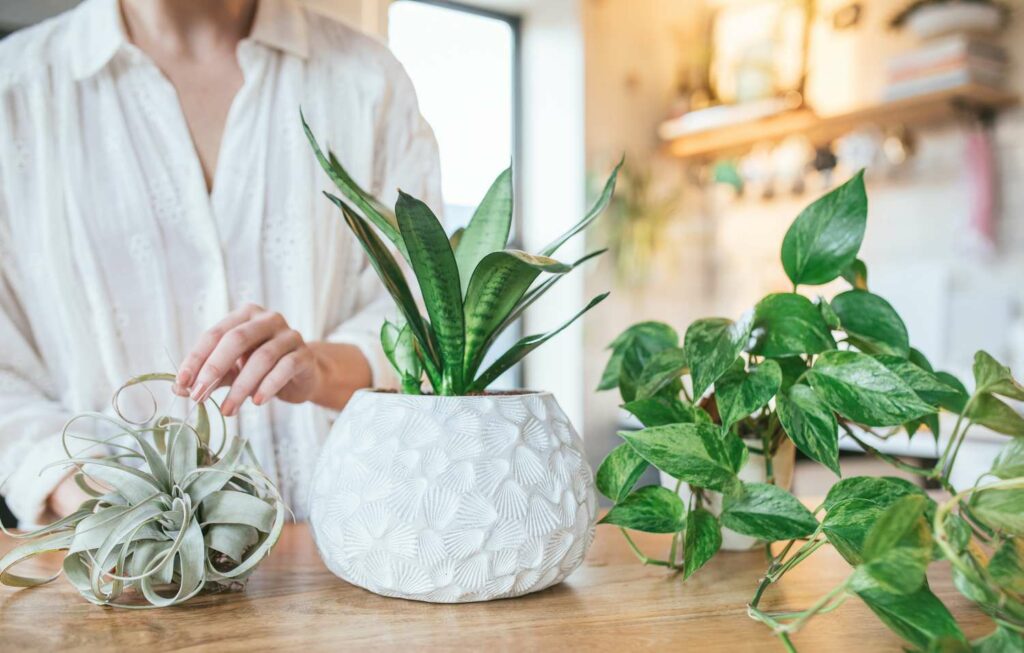A Conversation Worth Having: Talking to Your House Plants to Alleviate Anxiety

Life is fraught with stressors and uncertainties, and in the world of self-care and mental well-being, talking to plants is a conversation worth having. Scientific evidence suggests that engaging in dialogue with your leafy friends can have substantial mental health benefits. Let’s explore the rationale behind this practice and the tangible effects it can have on both plants and humans.
These unassuming green companions are recognized for their potential to boost self-care routines and alleviate anxiety. We invite you to explore the evidence that the care for house plants and your wellbeing is a two way street.
House Plants for Inner Peace and Stress Reduction
Anxiety disorders affect millions worldwide, with the World Health Organization estimating around 264 million cases. A growing body of research indicates that integrating house plants into indoor spaces can significantly impact mental health in a positive manner.
Institutional studies, including research by the University of Michigan, demonstrate that exposure to nature, even indoors, can tangibly reduce stress levels. House plants contribute to this effect by enhancing air quality, increasing humidity, and providing an aesthetic element to living spaces.
The impact of house plants on anxiety reduction can be traced to their emission of phytoncides—natural compounds that can lower stress hormones and elevate mood. A study published in the “Journal of Physiological Anthropology” revealed that individuals exposed to indoor plants reported lower anxiety levels and a heightened sense of comfort.
The concept of “biophilia” suggests that humans inherently connect with nature, and nurturing this connection can offer therapeutic benefits. House plants act as conduits for these biophilic experiences within urban settings.
Citing data from the American Horticultural Therapy Association, exposure to nature, even in the form of house plants, leads to a 37% reduction in reported tension and anxiety. Furthermore, a study in the “Journal of Environmental Psychology” noted that individuals with indoor plants experienced greater psychological restoration and stress reduction after engaging in mentally demanding tasks.
House Plants Preventing Anxiety
In a world focused on holistic well-being, exploring all avenues to enhance mental health is paramount. House plants, validated by scientific evidence, are emerging as crucial tools for self-care.
From tangible air quality improvements to the subconscious resonance of biophilia, rigorous research underscores the value of cultivating house plants. As society embraces these green allies, it becomes clear that their role in the pursuit of well-being is rooted in concrete evidence.
When seeking a moment of respite, consider turning to your leafy companions for a dose of nature’s tranquillity. The empirical link between house plants and well-being is a reminder that our efforts to nurture these plants are tantamount to nurturing our own peace and serenity.

The Science Behind Plant Communication: Unveiling the Green Dialogue
Research indicates that plants, although devoid of auditory systems, can respond to sound vibrations in their environment. This phenomenon raises the intriguing possibility that engaging in conversations with plants could affect their growth and overall health.
In the realm of horticulture, an age-old practice has sparked curiosity: talking to plants. While not yet fully backed by rigorous scientific evidence, a series of intriguing studies and historical insights have begun to shed light on the potential benefits of conversing with our leafy companions.
A landmark investigation by the Royal Horticultural Society offers an intriguing starting point. In this month-long study, ten diligent gardeners engaged in daily readings to tomato plants. Astonishingly, the tomatoes that received this spoken attention surpassed their non-read-to counterparts in size. Interestingly, the pitch of the reading voice seemed to play a role: tomato plants responded to female voices, growing at least an inch taller compared to those serenaded by deeper male voices.
The roots of this concept delve deep into history, tracing back to 1848 when a German professor authored “The Soul Life of Plants.” This pioneering work suggested that plants derived benefits from human conversation—a concept that has echoed through time. Even the renowned TV show “MythBusters” took up the challenge, experimenting to ascertain if sound could influence plant growth. Their findings added to the intriguing puzzle, revealing promising outcomes.
The secret lies in the way plants perceive and respond to their surroundings. These silent companions are far from passive; they sense vibrations in their environment, including sound. Intriguingly, these vibrations trigger the activation of pivotal genes linked to growth. The subtle art of human conversation could be an unexpected catalyst for this growth response.
Furthermore, the relationship between plants and carbon dioxide, a by-product of human speech, unfolds an additional layer of interaction. Plants are in constant connection with the environment, ramp up photosynthesis production in response to the carbon dioxide humans exhale. This highlights the interconnectedness of all life forms. As you engage in this green dialogue, both you and your plants stand to gain. Your plants thrive, and you find a refreshing outlet to destress, offering a haven to spill your secrets or simply vent in a judgment-free zone.
So, whether it’s sharing your deepest thoughts, recounting the day’s events, or even indulging in some light gossip, talking to your plants could very well be a silent yet harmonious exchange that benefits the well-being of both parties involved.
Studies conducted at institutions like the Royal Horticultural Society have explored into the notion of plant perception. Research suggests that plants are sensitive to external stimuli, including sound vibrations and even human speech. While their “listening” mechanisms might differ from our own, plants can indeed react to these cues in ways that impact their growth patterns and resilience.

The Human-Plant Connection: Mutual Benefits
One study published in “Ecological Indicators” explored the effects of sound vibrations on plant growth. The researchers found that exposing plants to specific sound frequencies led to enhanced root development and greater biomass. Although the precise mechanisms are still being unravelled, these findings imply that talking to your plants might not be as one-sided as it seems.
Engaging in conversations with plants isn’t solely about their growth; it also extends to human well-being. The practice taps into the concept of biophilia, reinforcing our innate connection to nature. This connection, when nurtured through plant communication, can contribute to reduced stress levels and enhanced feelings of well-being.
If you’re intrigued by the notion of talking to your plants, there are a few strategies to consider. First, maintain a consistent dialogue; while plants might not comprehend words, the vibrations of your voice could have an impact. Second, choose a calm and soothing tone—after all, the goal is to promote both plant and human relaxation. Lastly, integrate this practice into your existing self-care routine, perhaps during your morning or evening ritual.
The Final Word: A Conversation Worth Having
In a world that often overlooks the symbiotic relationship between humans and nature, engaging in conversations with plants emerges as a compelling practice. The science suggests that this interaction can yield benefits beyond what meets the eye, both for the plants themselves and the people who tend to them.
So, the next time you find yourself sharing your thoughts with your leafy companions, know that you’re partaking in a dialogue that transcends words. While plants might not respond in the conventional sense, the evidence suggests that your efforts are not in vain. After all, fostering this connection with nature is yet another path toward nurturing your own well-being.
Do you want to share your story and inspire our readers ? Know that every story is paving the way for a brighter, happier future.





